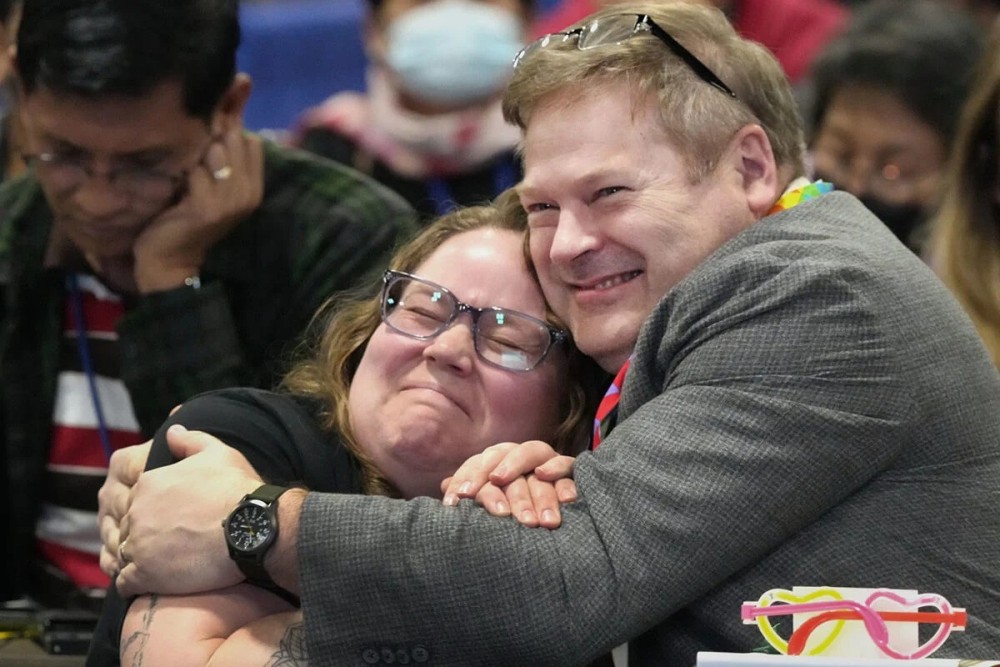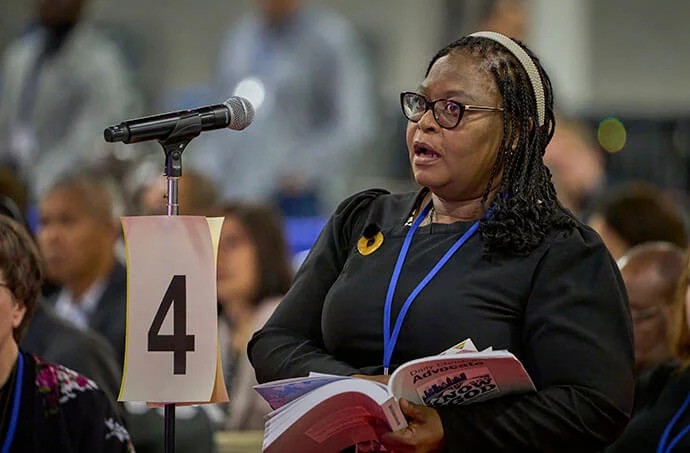UMC ends 52-year-old anti-gay stance

Kaleigh Corbett and Thomas Lank of the UMC's Greater New Jersey Conference embrace after general conference delegates voted on May 2 to eliminate the denomination's longtime anti-gay stance. (Photo by Larry McCormack, United Methodist News)
The United Methodist Church’s condemnation of homosexuality—which sparked a half-century of conflict—is now no more.
By a vote of 523 to 161 after about an hour and a half of debate, general conference delegates eliminated on Thursday the 52-year-old assertion in the denomination’s Social Principles that “the practice of homosexuality . . . is incompatible with Christian teaching.”
In the same vote, delegates affirmed “marriage as a sacred, lifelong covenant that brings two people of faith (adult man and adult woman of consenting age or two adult persons of consenting age) into a union of one another and into deeper relationship with God and the religious community.”
Randall Miller, who chaired the task force that led the development of the revisions approved over the past week, said this was a historic moment.
“It's been 40 years of work for me and others to remove the incompatibility clause from our Social Principles and really live in through our belief that all people are sacred,” said Miller, who is gay and long advocated for the full inclusion of LGBTQ people in church life. “Just deeply grateful and it's wonderful to have come to this moment.”
On May 1, in another momentous change, delegates voted by consent calendar to remove the denomination’s ban on the ordination of clergy who are “self-avowed practicing homosexuals”—a prohibition that dates to 1984.
The vote on the revision of the Social Principles did not come without debate, and an amendment that delegates adopted from Molly Hlekani Mwayera, delegate from the Zimbabwe East Conference and newly elected member of the denomination’s judicial council.
For Mwayera, the final “double-barrel” language that defines marriage as being between a man and a woman while adding that it can also be between “two adult persons of consenting age,” allows the church to be in line the laws in much of the world—including her home country.
She said United Methodists should be able to have a definition that meets the needs of their context.
“We are called to do no harm, do good and stay in love with God,” said Mwayera, echoing the late UMC Bishop Reuben Job.. “The failure to effectively define the issue of marriage is discriminatory and counter to our Wesleyan tradition.”

Molly Hlekani Mwayera, a lay delegate from the UMC Zimbabwe East Conference, proposes an amendment to a revision of the Social Principles dealing with marriage during a plenary session of the general conference on May 2. (Photo by Paul Jeffrey, United Methodist News)
Mwayera’s amendment also wove in three other parts of the newly adopted Social Principles—the rejection of child marriage, the stance against polygamy, and support for consent in sexual relationships.
But for a number of delegates, a different definition of marriage beyond just man and woman was a major sticking point.
Nimia Peralta, a delegate from the Northwest Philippines Conference, said she must hold with Jesus’ words in Matthew 19 that “a man will leave his father and mother and be united to his wife, and the two will become one flesh.”
“God defined marriage to be between a man and a woman,” she said. “While we celebrate worldwide regionalization, I truly believe the definition of marriage can never be regionalized.”
With Thursday’s vote, delegates have adopted the entire slate of revised Social Principles submitted by the United Methodist Board of Church and Society, the denomination’s social witness agency.
The Social Principles represent the denomination’s public stands on issues of the day and are not church law. But for many general conference delegates and observers, the change to the Social Principles was particularly hard won.
In 1972, delegates were considering a fresh set of Social Principles for their newly formed United Methodist Church—which had just come together in 1968 as a merger between the Methodist and the Evangelical United Brethren churches.
That’s when the 1972 delegates voted to add the words: “We do not condone the practice of homosexuality and consider it incompatible with Christian teaching.” The new statement came after the phrase “persons of homosexual orientation are persons of sacred worth.”
The 1972 General Conference also adopted the statement: “We do not recommend marriage between two persons of the same sex.”
Before that, the Book of Discipline—the denomination’s policy book—said nothing one way or the other about homosexuality.
Since 1972, the denomination’s stance on homosexuality became a recurring subject of debate and protest at each general conference. The legislative body increased restrictions changing what was initially a statement of social witness into a matter of church law.
Those added restrictions included banning clergy from officiating at same-sex weddings and banning clergy who are, in the words of the Discipline, “self-avowed practicing homosexuals.” Clergy found guilty of these church-law violations could face loss of credentials or lesser penalties.
The debate culminated with the 2019 special general conference, which by a vote of 438-384 passed the Traditional Plan that aimed to strengthen those restrictions. In a separate vote, delegates approved a disaffiliation provision, which about a quarter of US churches used to leave the denomination. Most of the departures ended up being theologically conservative churches that supported the bans.
At this year’s general conference, delegates have been rolling back these restrictions.
A slate of revised Social Principles came after an international, multiyear process authorized by the 2012 general conference to develop a “more globally relevant, theologically founded and succinct” version.
Church and Society carried out that effort with a writing team of 52 United Methodists from Africa, Europe, the Philippines, and the US, who drafted the proposed revised Social Principles. That draft then received input from more than 4,000 United Methodists worldwide before the final submission.
John Hill, Church and Society’s interim top executive, said days before the May 2 vote that his agency’s hope is that the language in all the revised Social Principles will resource and equip ministry in as many settings around the world as possible.
“Around the issues of human sexuality and marriage, we have a church whose local contexts are dramatically different,” Hill said. “So our hope was to have statements that could speak theologically to these matters, but not to any specific context. Instead, they could be applied across contexts.” —United Methodist News Service





